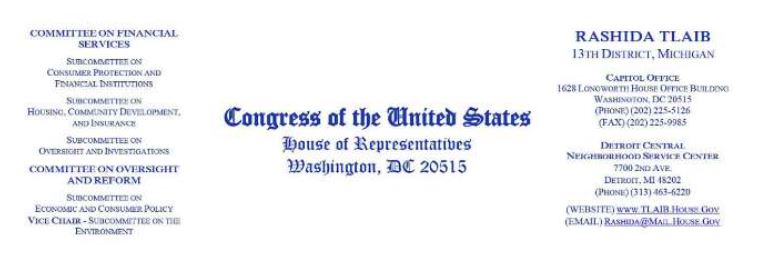
June 26, 2020
The Honorable Gretchen Whitmer
Governor, State of Michigan
PO Box 30013
Lansing, MI 48909
Dear Governor Whitmer,
It has come to my attention that the Detroit International Bridge Company (DIBC) has renewed its lobbying effort in Lansing to change a decision made by the Snyder administration prohibiting hazardous materials from traveling across the Ambassador Bridge. I understand DIBC has contacted the Michigan Department of Transportation (MDOT) and is enlisting the support of a number of lawmakers who take their campaign donations. I write to you to state in no uncertain terms that DIBC is a bad actor, a repeat offender that puts profits ahead of safety, and that the people in the neighborhoods surrounding the Ambassador Bridge are unequivocally opposed to allowing hazardous materials to be trucked through their streets and across the bridge. Any decision lifting the current prohibition would be met with widespread community outrage, and I urge your administration to uphold the Snyder administration’s well-reasoned decision.
DIBC’s entire push rests on a flawed technical report issued by MDOT in 2012, one that I urge your administration to reject as the Snyder administration did. The National Hazardous Material Route Registry may and should only be changed to enhance public safety, yet the 2012 MDOT report entirely failed to explain how allowing hazardous materials across the Ambassador Bridge would enhance public safety. Three schools and two large public parks are located within the immediate vicinity of the bridge, and 40% of the surrounding residents are children. We cannot put our residents at any further risk.
The communities surrounding the Ambassador Bridge are amongst the most polluted in the entire state, and have fought for decades against DIBC for their right to breathe clean air. Just late last year, they were subjected to a disturbing dock collapse and hazardous and radioactive materials exposure at the Revere Copper site in Detroit, and hundreds of residents turned out at public meetings to express their fears about further pollution of their water and air. Our residents in these neighborhoods should not have to worry about new threats traveling across a bridge owned by a company that has repeatedly abused them.
Since it opened, the Ambassador Bridge has been subject to hazardous materials restrictions. While other international crossings that allow hazardous materials transport are operated by, open to, and regularly inspected by government officials, DIBC continues to restrict government inspectors and enforcement.